|
|
|
Sort Order |
|
|
|
Items / Page
|
|
|
|
|
|
|
| Srl | Item |
| 1 |
ID:
166931


|
|
|
|
|
| Summary/Abstract |
This paper presents a quasi-randomized controlled trial in a workplace with personalized lighting control and investigates the impact of automated demand response (DR) on employees. It also clarifies what type of conditions will make employees participate in DR. To meet this objective, we set up four treatment groups: opt-in performance incentive, opt-in fixed incentive, opt-out performance incentive, and opt-out fixed incentive. In the experiment, the group with the highest participation rate is the opt-out fixed incentive. Subsequently, we estimate two average treatment effects (intent-to-treat and treatment-on-treated) for DR. The results reveal a significant reduction in electricity consumption during peak hours for all four treatment groups. We find that although the DR participation rate is high for the opt-out group, its average energy-saving effect is not significantly different than that for the opt-in group, and the average energy-saving amount of opt-in consumers is larger than that of opt-out consumers. We also show a similar trade-off between the participation rate and the power-saving effect for employees participating in DR.
|
|
|
|
|
|
|
|
|
|
|
|
|
|
|
|
| 2 |
ID:
169790
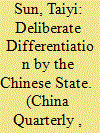

|
|
|
|
|
| Summary/Abstract |
Do authoritarian governments’ responses towards different civil society organizations (CSOs) reflect policy differentiations? Building on the existing literature of graduated control, diversification of civil society, and consultative authoritarianism, this paper utilizes an online field experiment,1 and interviews with government officials and CSO leaders to demonstrate that local governments have the tendencies to intentionally treat different CSOs with different policy responses, referred to as “deliberate differentiation” in this paper. However, contrary to what the existing literature would suggest, this study reveals that at the local level, such differentiation is driven more by the state's interest in extracting productivity and outsourcing responsibility for the provision of public goods and less by the state's need to acquire information from CSOs, including politically sensitive advocacy groups.
|
|
|
|
|
|
|
|
|
|
|
|
|
|
|
|
| 3 |
ID:
119200


|
|
|
|
|
| Publication |
2013.
|
| Summary/Abstract |
Empirical evidence concerning the demographics and development of Chinese nationalism is sparse but important for scholarship and policy. Its collection entails methodological challenges in access and reliability. We conducted a field experiment to measure nationalism in incentive-compatible choices among a diverse group of 447 Chinese subjects in a field setting. Our results demonstrate greater nationalism in female, older, less affluent and more rural respondents. We also find support for nationalism in professional and educated individuals. Our results provide qualified support for a middle-class nationalism in China.
|
|
|
|
|
|
|
|
|
|
|
|
|
|
|
|
| 4 |
ID:
124107
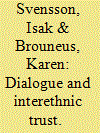

|
|
|
|
|
| Publication |
2013.
|
| Summary/Abstract |
The growing field of peacebuilding has tried to mitigate interethnic conflicts by creating various sorts of dialogue programs, aiming to build social bonds and bridges between individuals from groups with a history of violent interaction. Yet, little is known of the effect of dialogue initiatives on interethnic relations and peacebuilding. Previous research on dialogue programs has suffered from the serious problem of selection bias: in other words, by not having comparable control groups it has not been possible to separate selection effects (that a program attracts certain types of people) from process effects (that programs have an effect on people). The present study is the first to examine the effects of a dialogue process in a context of political tension and ethnic violence through a randomized field experiment, thereby eliminating this problem. Using a stratified randomization process, participants were selected to a two-term Sustained Dialogue program at Addis Ababa University, Ethiopia, in 2009-10. Immediately following the dialogue intervention, an attitudinal survey and a behavioral trust game were conducted with a group of 716 participants and non-participants. We found that the program had a positive effect on participants' attitudes: it worked for decreasing mistrust and increasing the level of trust between people of different ethnic origins. Concurrently, however, participation in the dialogue program increased the sense of importance of ethnic identities as well as the perception of being ethnically discriminated - a somewhat counter-intuitive finding. Participation in dialogue processes had no significant effect on game behavior: participants in Sustained Dialogue were neither more trusting nor trustworthy than non-participants. This study shows the fruitfulness of randomized field-experiments in the area of peace and conflict research and finishes by identifying some important paths for future research.
|
|
|
|
|
|
|
|
|
|
|
|
|
|
|
|
| 5 |
ID:
141642
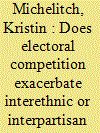

|
|
|
|
|
| Summary/Abstract |
Does political competition exacerbate economic discrimination between citizens on ethnic or partisan cleavages? Individuals often discriminate on group lines in ordinary economic activities, especially in low-income settings. Political competition, and thus mobilization of partisan and ethnic groups, waxes and wanes over the electoral cycle. This study therefore investigates discrimination over the electoral cycle in a commonplace yet consequential economic activity: market price bargaining. By conducting field experiments on taxi fare bargaining at three points in time around Ghana’s 2008 election, the research reveals that drivers accept lower prices from coethnics regardless of temporal proximity to the election. However, only at election time, drivers accept lower prices from copartisans and demand higher prices from noncopartisans. In sum, political competition affects commonplace economic transactions between citizens on the partisan cleavage. This study is the first to show evidence of interpartisan discrimination in everyday behavior and expands our knowledge of electoral cycle effects.
|
|
|
|
|
|
|
|
|
|
|
|
|
|
|
|
| 6 |
ID:
166324
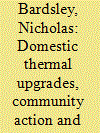

|
|
|
|
|
| Summary/Abstract |
A three-year field experiment was conducted with 185 prosperous households to assess whether behavioural interventions by a community environmental group during and after thermal upgrades (cavity wall and/or loft insulation) can achieve reductions in households’ energy use, including reductions in direct and indirect rebound. The engineering interventions on the thermal efficiency of dwellings appear effective in reducing energy use in both treatment and control groups: a direct rebound effect is estimated to be at most 40 per cent from the engineering interventions. However, across a range of measures of energy use, we observe no significant effect of the community behavioural intervention across the total lifetime of the project. Qualitative data collected on similar community groups suggests substantial constraints on their capacity to realise reductions in energy use amongst households.
|
|
|
|
|
|
|
|
|
|
|
|
|
|
|
|
| 7 |
ID:
140805


|
|
|
|
|
| Summary/Abstract |
Social cooperation is critical to a wide variety of political and economic outcomes. For this reason, international donors have embraced interventions designed to strengthen the ability of communities to solve collective-action problems, especially in post-conflict settings. We exploit the random assignment of a development program in Liberia to assess the effects of such interventions. Using a matching funds experiment we find evidence that these interventions can alter cooperation capacity. However, we observe effects only in communities in which, by design, both men and women faced the collective action challenge. Focusing on mechanisms, we find evidence that program effects worked through improvements in mobilization capacity that may have enhanced communities’ ability to coordinate to solve mixed gender problems. These gains did not operate in areas where only women took part in the matching funds experiment, possibly because they could rely on traditional institutions unaffected by the external intervention. The combined evidence suggests that the impact of donor interventions designed to enhance cooperation can depend critically on the kinds of social dilemmas that communities face, and the flexibility they have in determining who should solve them.
|
|
|
|
|
|
|
|
|
|
|
|
|
|
|
|
| 8 |
ID:
105174


|
|
|
|
|
| Publication |
2011.
|
| Summary/Abstract |
We report the results of the first large-scale experiment involving paid political advertising. During the opening months of a 2006 gubernatorial campaign, approximately $2 million of television and radio advertising on behalf of the incumbent candidate was deployed experimentally. In each experimental media market, the launch date and volume of television advertising were randomly assigned. In order to gauge movement in public opinion, a tracking poll conducted brief telephone interviews with approximately 1,000 registered voters each day and a brief follow-up one month after the conclusion of the television campaign. Results indicate that televised ads have strong but short-lived effects on voting preferences. The ephemeral nature of these effects is more consistent with psychological models of priming than with models of on-line processing.
|
|
|
|
|
|
|
|
|
|
|
|
|
|
|
|
| 9 |
ID:
149360


|
|
|
|
|
| Summary/Abstract |
College students are young, have little or no history of voting, and are residentially mobile, which makes them a population in great need of registering to vote. Universities have a civic, pedagogical, and legal obligation to register their students to vote. In 2006, we conducted a controlled experiment across 16 college campuses to test the efficacy of classroom presentations to increase voter registration. The 25,256 students across more than 1,026 classrooms were randomly assigned to one of three conditions: (1) a control group receiving no presentation; (2) a presentation by a professor; and (3) a presentation by a student volunteer. Verifying registration and voter turnout from a national voter database, we found that both types of presentations increased overall registration by 6 percentage points and turnout rates by approximately 2.6 percentage points. These results demonstrated that universities can take simple steps to engage their students in politics.
|
|
|
|
|
|
|
|
|
|
|
|
|
|
|
|
| 10 |
ID:
180104
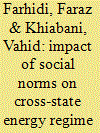

|
|
|
|
|
| Summary/Abstract |
We present a survey study that explores two experimental analysis: first, a cross-country norms effect on petition signing, and second, a cross-state comparison, focusing on clean energy adaptation instead of fossil fuel energy. In the first study, we use energy consumption information from the US, EU, and China. Using the first study as a pilot, we redesigned the second experiment by providing energy utilization for Arizonian and New Mexican to validate our norms by comparing their states' green energy consumption to the pioneer states separately. The results of the research point out that social norms can effectively influence the participants in different angles. The attendants are more likely to sign a petition—by seven percent—in favor of clean energy act when they have been provided with additional information. This research highlights that not only social norms could be compelling individuals’ behavior, but also that they are sensitive to the types of information which are disclosed to them.
|
|
|
|
|
|
|
|
|
|
|
|
|
|
|
|
| 11 |
ID:
140804
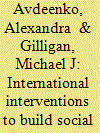

|
|
|
|
|
| Summary/Abstract |
Increasingly the international community attempts to improve local public infrastructure in developing countries by creating more participatory local governance and social capital. We report on a randomized field experiment conducted in 24 communities (16 treated and 8 control) in rural Sudan. We offer a clearer theoretical statement of how these programs might alter the political landscape of the recipient villages. We measure norms using lab-in-the-field techniques and we measure network density with a survey of our 475 lab subjects. We appraise the participatory character of local governance and civic participation with a survey of 576 households. The program did not affect either networks or norms, but civic participation and the participatory nature of local governance increased. Thus we attribute the increase in citizen participation not to social capital growth but to more open local governing institutions.
|
|
|
|
|
|
|
|
|
|
|
|
|
|
|
|
| 12 |
ID:
162215


|
|
|
|
|
| Summary/Abstract |
We test whether politicians’ communications shape their supporters’ policy priorities by conducting a field experiment in collaboration with several local elected officials. In the experiment, the officials sent out email messages to the constituents on their distribution lists. Half the constituents received messages where the official advocated for the priority of a given issue, while the other half received a placebo email. We surveyed the constituents one to two months before the message went out and again the week after the official sent the message. The experiment shows that politicians did not change citizens’ priorities in the desired direction. Moreover, citizens who received a message where the official indicated the issue was a priority were not more likely to act when invited to sign a petition on the issue. Elected officials’ ability to shape the priorities of the politically active citizens with whom they regularly communicate is limited and can even be self-defeating.
|
|
|
|
|
|
|
|
|
|
|
|
|
|
|
|
| 13 |
ID:
180227
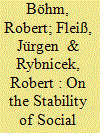

|
|
|
|
|
| Summary/Abstract |
Despite the omnipresence of inter-group conflicts, little is known about the heterogeneity and stability of individuals’ social preferences toward in-group and out-group members. To identify the prevalence and stability of social preferences in inter-group conflict, we gather quota-representative, incentivized data from a lab-in-the-field study during the heated 2016 Austrian presidential election. We assess social preferences toward in-group and out-group members one week before, one week after, and three months after the election. We find considerable heterogeneity in individuals’ group-(in)dependent social preferences. Utilizing various econometric strategies, we find largely stable social preferences over the course of conflict. Yet, there is some indication of variation, particularly when the conflict becomes less salient. Variation is larger in social preferences toward in-group members and among specific preference types. We discuss the theoretical implications of our findings and outline potential avenues for future research.
|
|
|
|
|
|
|
|
|
|
|
|
|
|
|
|
| 14 |
ID:
125442


|
|
|
|
|
| Publication |
2013.
|
| Summary/Abstract |
Residential energy conservation is a key component of contemporary energy and climate change policy in the US and elsewhere. Comparisons of the relative effectiveness of measures aimed at reducing residential energy consumption are made challenging, however, by the endogeneity of technology and energy use decisions. In this paper we describe a novel small-scale field experiment that uses randomized treatments to estimate the returns to three types of energy conservation measures in institutionally owned homes. The results from the experiment indicate considerable reductions in natural gas consumption associated with the installation of attic insulation and the provision of incentives for conservation. The results are supported by observations of ambient indoor temperature data, which show that households receiving incentives significantly reduce their temperature settings-especially when coupled with access to a programmable thermostat. The study will ideally provide guidance for institutions and communities considering energy efficiency measures and for future researchers designing randomized experiments to study residential energy use.
|
|
|
|
|
|
|
|
|
|
|
|
|
|
|
|
| 15 |
ID:
175300


|
|
|
|
|
| Summary/Abstract |
Researchers often want to increase the broader societal impact of their work. One way to do that is to discuss research findings directly with practitioners. Yet, such interactions are voluntary and do not regularly arise, which raises a key demand question: Under what conditions do practitioners want to connect with researchers? This article shows that relational considerations affect these decisions—that is, what practitioners expect the interaction will be like. I partnered with a US-based civic association to conduct a field experiment. I find that group leaders in this association are more likely to speak with researchers after learning that the researchers will (1) efficiently share information during the interaction, and (2) value practitioners’ knowledge. The results provide actionable guidance for how researchers should approach practitioners and also demonstrate one powerful way that social science evidence can inform efforts to bridge research and practice.
|
|
|
|
|
|
|
|
|
|
|
|
|
|
|
|
|
|
|
|
|